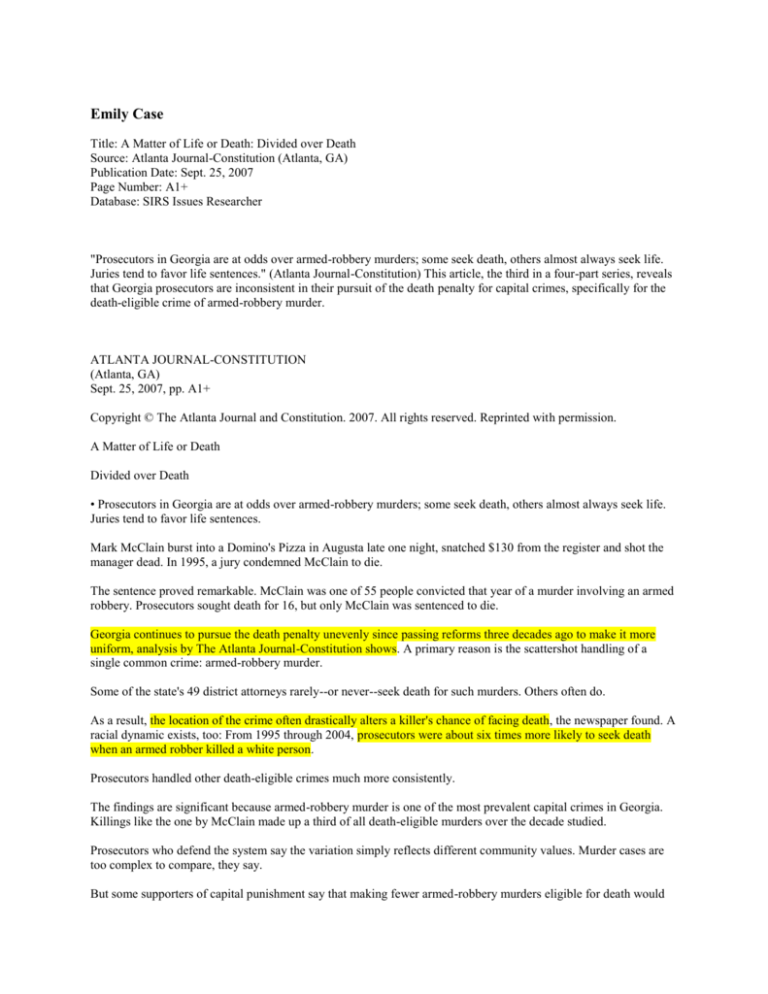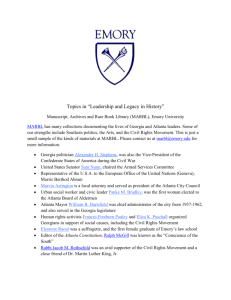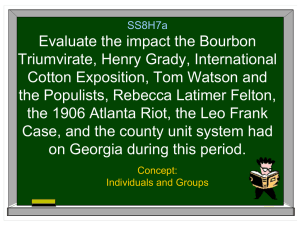
Emily Case
Title: A Matter of Life or Death: Divided over Death
Source: Atlanta Journal-Constitution (Atlanta, GA)
Publication Date: Sept. 25, 2007
Page Number: A1+
Database: SIRS Issues Researcher
"Prosecutors in Georgia are at odds over armed-robbery murders; some seek death, others almost always seek life.
Juries tend to favor life sentences." (Atlanta Journal-Constitution) This article, the third in a four-part series, reveals
that Georgia prosecutors are inconsistent in their pursuit of the death penalty for capital crimes, specifically for the
death-eligible crime of armed-robbery murder.
ATLANTA JOURNAL-CONSTITUTION
(Atlanta, GA)
Sept. 25, 2007, pp. A1+
Copyright © The Atlanta Journal and Constitution. 2007. All rights reserved. Reprinted with permission.
A Matter of Life or Death
Divided over Death
• Prosecutors in Georgia are at odds over armed-robbery murders; some seek death, others almost always seek life.
Juries tend to favor life sentences.
Mark McClain burst into a Domino's Pizza in Augusta late one night, snatched $130 from the register and shot the
manager dead. In 1995, a jury condemned McClain to die.
The sentence proved remarkable. McClain was one of 55 people convicted that year of a murder involving an armed
robbery. Prosecutors sought death for 16, but only McClain was sentenced to die.
Georgia continues to pursue the death penalty unevenly since passing reforms three decades ago to make it more
uniform, analysis by The Atlanta Journal-Constitution shows. A primary reason is the scattershot handling of a
single common crime: armed-robbery murder.
Some of the state's 49 district attorneys rarely--or never--seek death for such murders. Others often do.
As a result, the location of the crime often drastically alters a killer's chance of facing death, the newspaper found. A
racial dynamic exists, too: From 1995 through 2004, prosecutors were about six times more likely to seek death
when an armed robber killed a white person.
Prosecutors handled other death-eligible crimes much more consistently.
The findings are significant because armed-robbery murder is one of the most prevalent capital crimes in Georgia.
Killings like the one by McClain made up a third of all death-eligible murders over the decade studied.
Prosecutors who defend the system say the variation simply reflects different community values. Murder cases are
too complex to compare, they say.
But some supporters of capital punishment say that making fewer armed-robbery murders eligible for death would
focus prosecutors' attention on the most heinous. It could also address criticism that Georgia's penalty is costly and
arbitrary.
"You're accomplishing not only your primary goal of seeking the death penalty against the worst of the worst, but
you're preserving society's resources," said former district attorney Alan Cook, director of the Prosecutorial Clinic at
the University of Georgia's law school.
Lawmakers, however, have not revisited the question of which murders should qualify for execution since 1976,
leaving Georgia's death penalty law frozen in time.
Citation (MLA) :
Vogell, Heather, and Bill Rankin. "A Matter of Life or Death: Divided over Death." Atlanta Journal-Constitution
(Atlanta, GA). Sept. 25 2007: A1+. SIRS Issues Researcher. Web. 10 Jan 2012.









